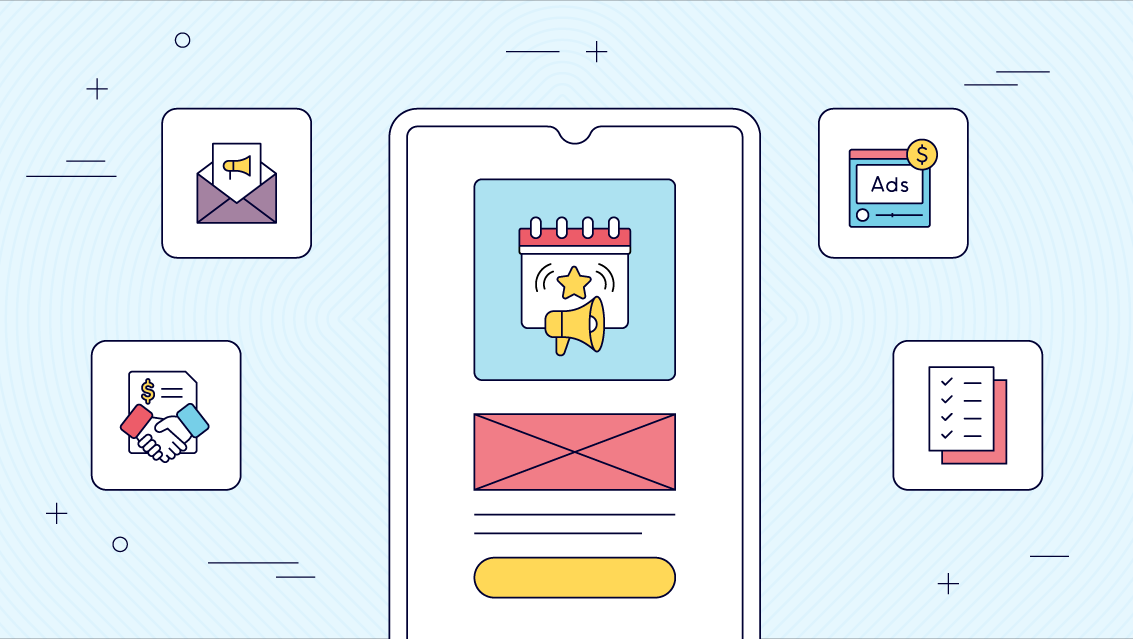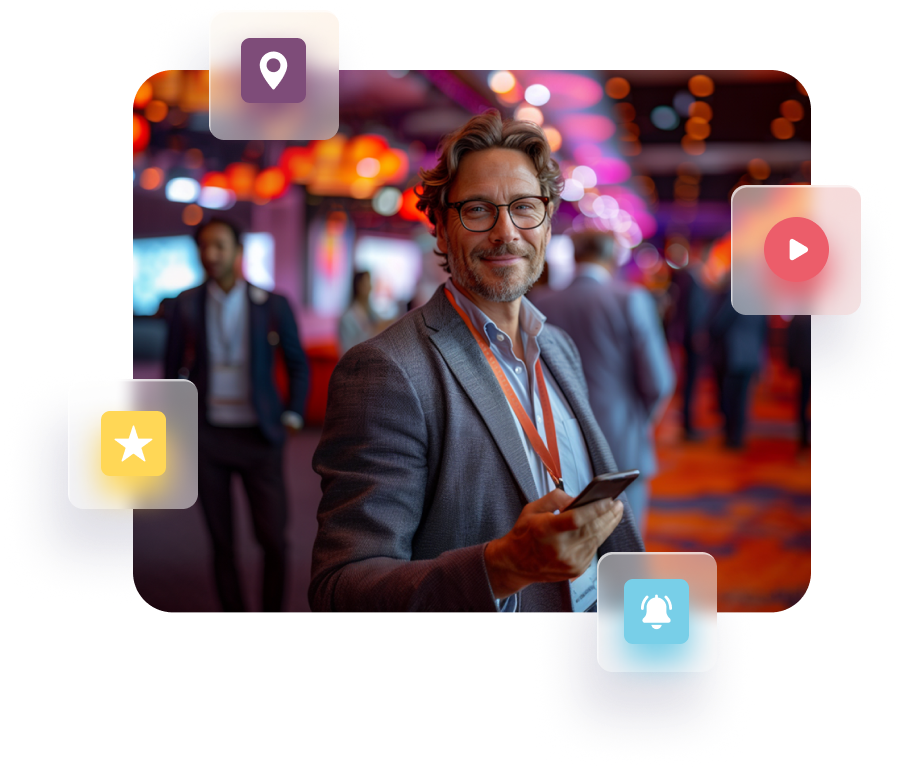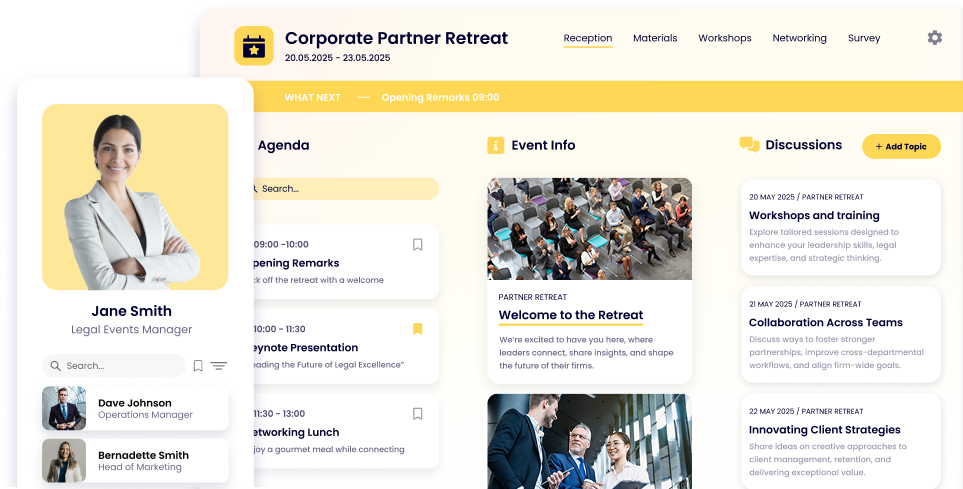Top Event Marketing Strategies for 2025: Expert Tips & Insights

Lisa Broom | Head of Marketing

Event marketing is a strategy where brands use in-person, virtual, or hybrid events to connect with customers and increase brand awareness. It is an effective way to engage your audience, generate leads, and build lasting customer relationships. This article will explore top strategies for event marketing in 2025, providing expert tips and insights on how to make your events memorable and impactful.
Key Takeaways
- Event marketing enhances brand visibility and fosters genuine customer connections through in-person, virtual, and hybrid events.
- A robust event marketing strategy increases brand awareness, engages target audiences, and drives lead generation and sales.
- Leveraging technology and effective promotion channels, including social media and email marketing, is essential for successful event marketing.
What is Event Marketing?

Event marketing involves engaging customers and enhancing brand visibility through various types of events, including in-person, virtual, and hybrid events. The primary goal is to create genuine connections with audiences, offering unique opportunities to engage with buyers in real-time. In today’s digital age, event marketing provides brands with a competitive advantage through immersive and memorable experiences.
Event marketing transforms marketing efforts into deeper experiences. By embracing change and improvement, brands can exceed expectations and foster long.
Why is Event Marketing Important?
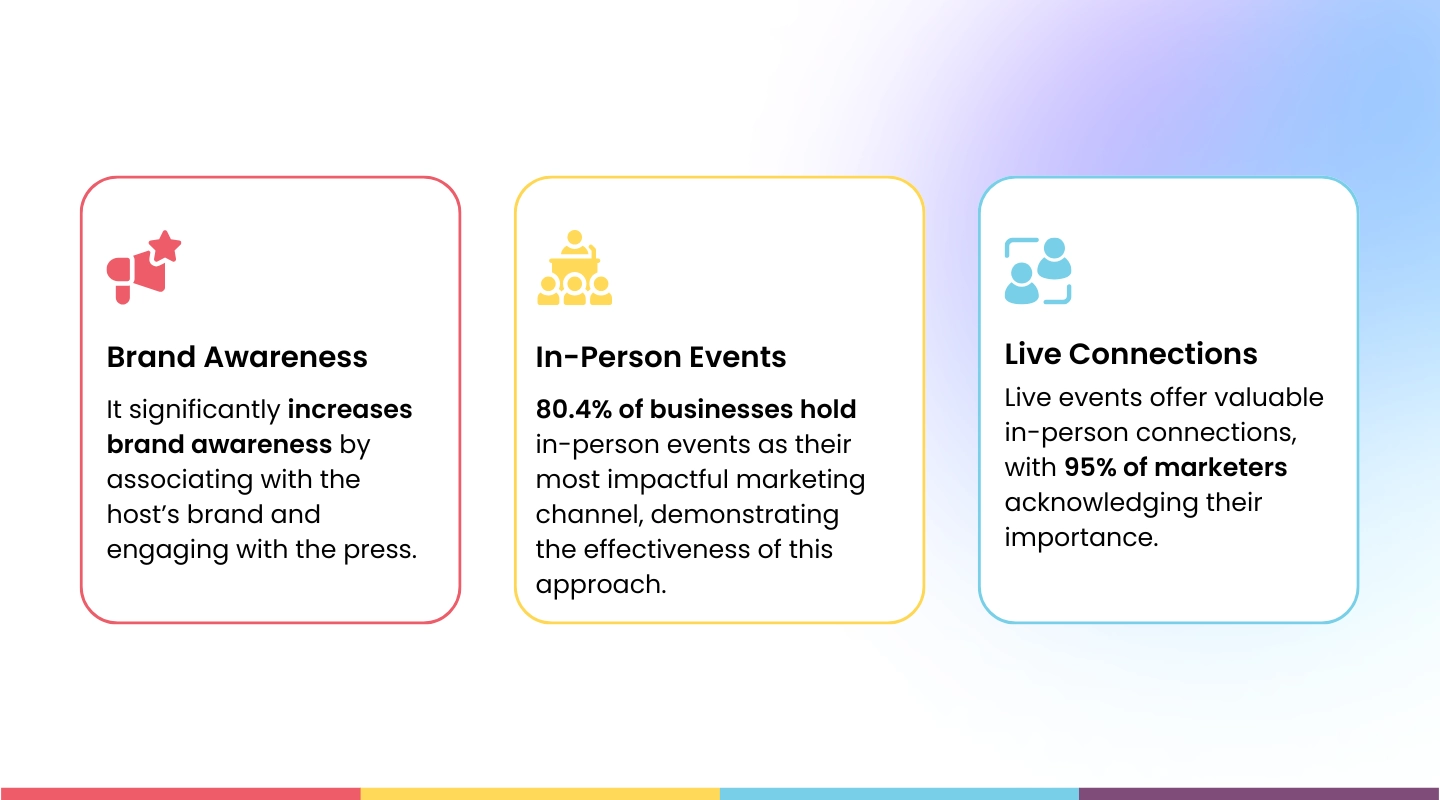
Event marketing is crucial for several reasons:
- It significantly increases brand awareness by associating with the host’s brand and engaging with the press.
- 80.4% of businesses hold in-person events as their most impactful marketing channel, demonstrating the effectiveness of this approach.
- Live events offer valuable in-person connections, with 95% of marketers acknowledging their importance.
Moreover, event marketing strategies help brands connect with buyers on a meaningful level, fostering customer loyalty and enhancing customer engagement. The increased importance of events today compared to before the pandemic is recognized by 48% of teams, highlighting the growing significance of event marketing in the current landscape.
In summary, event marketing aims to:
- Increase brand awareness
- Engage target audiences
- Generate leads
- Foster customer loyalty
Investing in a robust event marketing strategy ensures long-term success and builds lasting customer relationships.
Key Benefits of Event Marketing
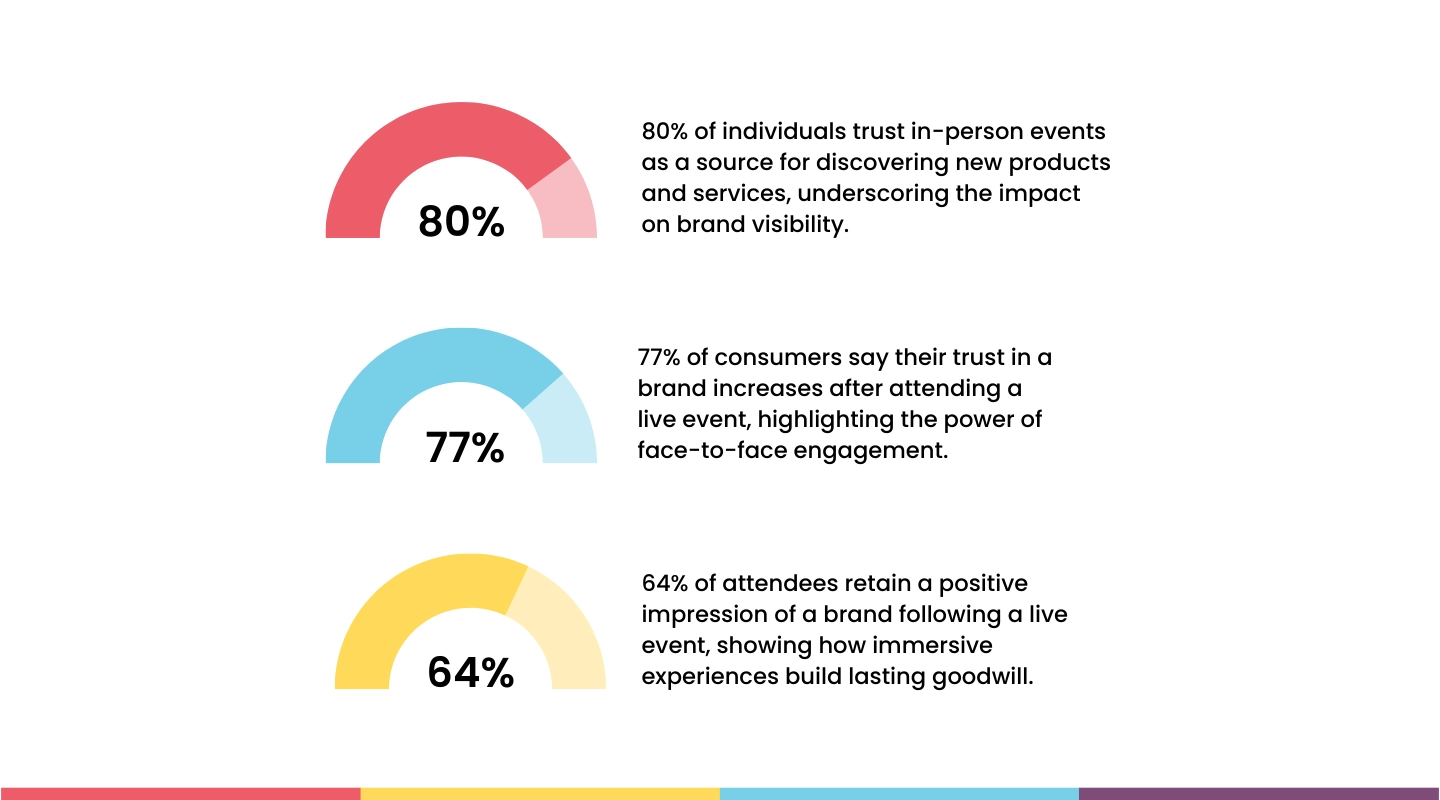
A strong event marketing strategy can significantly enhance brand awareness and engagement before, during, and after the event. The key benefits of event marketing include enhancing brand awareness, building strong customer relationships, and generating leads and sales.
Each of these benefits will be explored in detail in the following subsections.
Enhancing Brand Awareness
One of the primary reasons for hosting events is to build brand awareness. Companies use event marketing to promote their brand to a relevant audience, meet decision-makers, and facilitate sales. In-person events are highly effective. They hold the trust of 80% of individuals when it comes to discovering new products and services.
Events like 29Rooms have exemplified the power of event marketing in raising brand awareness and building consumer relationships. Customers enjoy unique experiences in memorable, immersive settings offered by pop-up events, characterized by limited-time engagements with interactive displays and activities. These events provide a unique and memorable experience that resonates with attendees, leading to increased brand visibility and customer engagement.
Local meetups and online educational events are also effective strategies for enhancing brand awareness. Online educational events have gained popularity. This is mainly due to their convenience for attendees during the workday. Sponsoring local meetups can serve as effective opportunities to enhance brand visibility and connect with the community.
Building Strong Customer Relationships
Event marketing creates opportunities for brands to forge meaningful connections with their audience through face-to-face interactions. These interactions can deepen relationships with both new prospects and existing clients, enhancing customer engagement and fostering long-term loyalty. The immersive nature of event marketing enables brands to create unique experiences that resonate with audiences on a deeper level.
Positive memories from events make consumers more inclined to recommend and work with the brand. In fact, 77% of consumers trust brands more after live events, and 64% retain positive impressions of brands after such experiences. The relationships established at events are often warmer and more ready to act, providing a significant advantage for brands.
Industry events offer a key opportunity to meet business decision-makers and other influential stakeholders. Overall, physical events significantly enhance customer relationships through memorable experiences and direct engagement, leading to increased customer loyalty and satisfaction.
Generating Leads and Sales
Event marketing provides key benefits such as lead acquisition and customer conversion. Engaging with leads during events can convert them from marketing qualified leads to sales qualified leads, driving the sales pipeline. Conferences and industry events are particularly effective for lead generation, allowing brands to engage with their target audience, understand their pain points, and facilitate decision-making.
Securing a speaking slot at events allows companies to present executives as thought leaders, building brand trust and generating interest. This, in turn, helps in building brand awareness and establishing the company as an authority in the industry.
Overall, a well-executed event marketing strategy can significantly enhance lead generation and sales, providing a valuable return on investment for brands.
Channels for Effectively Marketing for your events
To effectively market your events, it’s crucial to choose the right channels that resonate with your target audience.
- Social media is one of the most powerful tools for event promotion, allowing brands to reach a wide audience and engage with them in real-time.
- Platforms like Facebook, Instagram, and LinkedIn are particularly effective for sharing event updates, behind-the-scenes glimpses, and engaging content.
- Podcasts are another effective channel for event marketing, offering a unique way to reach and engage with your audience.
- Featuring event-related content and expert interviews on podcasts can drum up interest and excitement.In addition to social media and podcasts, consider leveraging email marketing, content marketing, and partnerships with influencers to promote your events. Each channel offers unique benefits and can help you reach a broader audience, ultimately contributing to the success of your event.
Crafting Your Event Marketing Strategy
A successful event marketing strategy requires thorough planning that includes setting objectives and defining key performance indicators. By following a structured approach, you can ensure that all aspects of your event are well-coordinated and aligned with your overall marketing goals. Steps to develop event marketing strategies include planning, promoting, and executing marketing events, addressing sponsors, partners, and exhibitors’ objectives.
A well-defined marketing strategy guides you toward success and mitigates challenges. Engaging attendees prior to the event can significantly mitigate feelings of boredom during the event. The stakeholder journey should consider the experience of attendees and partners before, during, and after the event, ensuring that all touchpoints are addressed.
The following subsections will delve into setting clear event goals, identifying your target audience, and budgeting and resource allocation.
Setting Clear Event Goals
Establishing specific and measurable goals is crucial for directing event marketing efforts effectively. SMART goals, defined as Specific, Measurable, Achievable, Relevant, and Timely, provide a clear framework for setting event objectives. When setting event goals, it is important to pick three areas of focus to ensure clarity and direction.
Clearly defining event goals creates a roadmap for success, aligning all marketing efforts with your objectives and helping measure the success of your event.
Identifying Your Target Audience
Targeting the right audience at events is essential for maximizing marketing effectiveness. Understanding attendee demographics and preferences allows you to create tailored marketing messages that resonate with your audience. Personas in event marketing are fictional characters representing core attendees and stakeholders, helping you to better understand and engage with your target audience.
Effective marketing strategies should consider factors such as the value to the participant, their needs, pain points, and how the event provides solutions. Identifying your target audience and creating personas improve event marketing communications, ensuring messages are tailored effectively.
Budgeting and Resource Allocation
Setting a clear budget helps prioritize spending on critical aspects of event marketing, ensuring effective resource allocation. Key considerations for budgeting in event marketing include allocating funds for the venue, marketing, and staff, while prioritizing key aspects. The recommended percentage of gross revenue to allocate for the event marketing budget is between 15% to 20%.
It is important to monitor spending during event planning to adjust as needed and ensure effective budgeting. After the event, reviewing the budget execution offers valuable insights. These insights can help improve future planning.
Leveraging Technology in Event Marketing
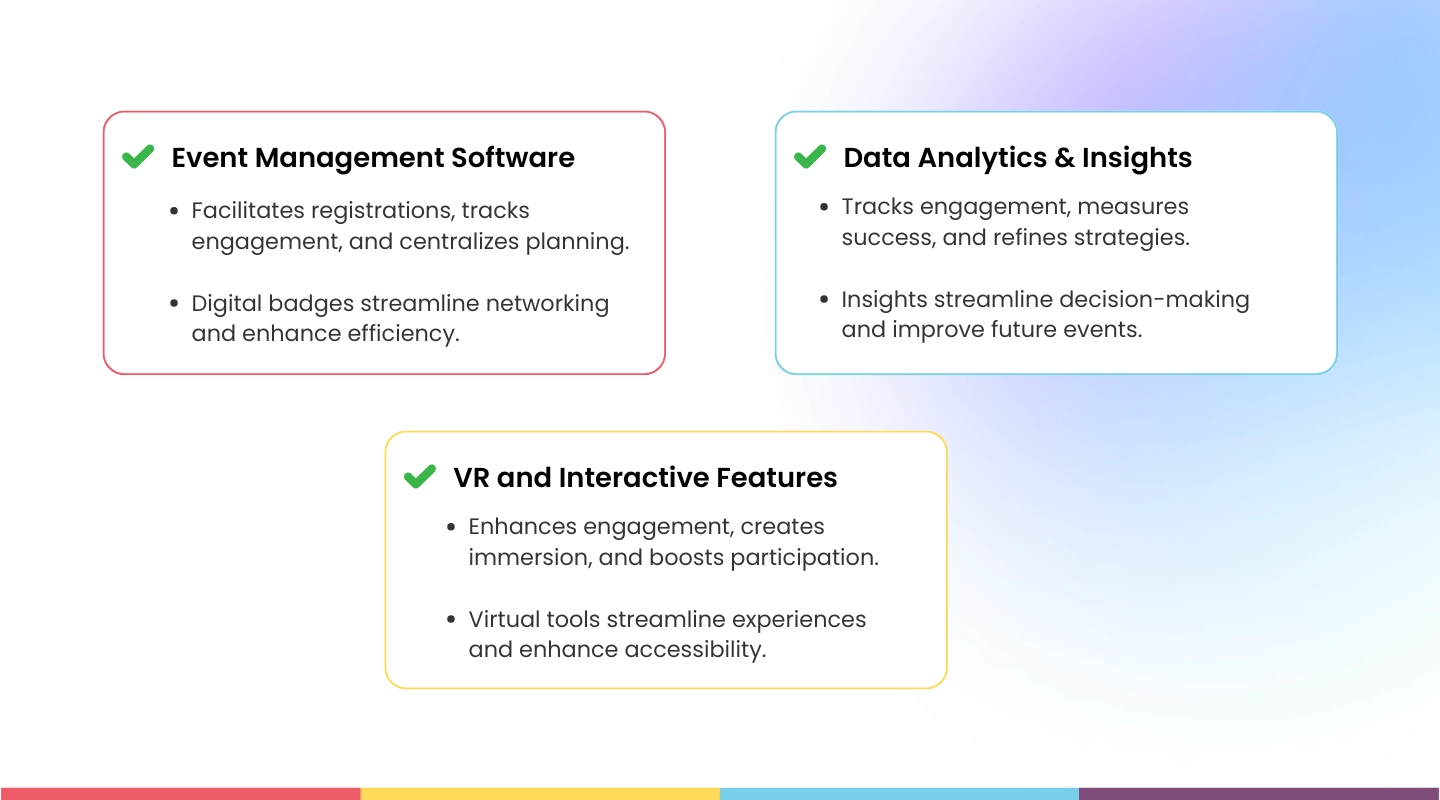
The adoption of technology in event marketing is growing, with tools like AI, virtual reality, and data analytics playing a critical role in enhancing event marketing efforts. Technology makes events more engaging and efficient, allowing brands to create immersive experiences that resonate with attendees. This section will explore the use of event management software, virtual reality and interactive features, and data analytics and insights.
Leveraging the right technology streamlines event planning, enhances attendee engagement, and provides valuable insights for future improvements. The following subsections will delve deeper into these technological advancements and their impact on event marketing.
Event Management Software
Choosing the right event management software can significantly enhance productivity and collaboration among event teams. These tools facilitate various aspects of event planning, from managing registrations to tracking attendee engagement. Integrated dashboards and tools such as beacons can help event planners illustrate the attendee journey effectively, providing a seamless experience for both organizers and participants.
Digital badges are another useful technology at events for exchanging information, wayfinding, recording interactions, and networking. Unlike Bluetooth-enabled apps that consume data plans and phone power, digital badges offer a more efficient option.
Utilizing advanced tools not only streamlines planning but also enhances the overall attendee experience, making the event more memorable and impactful.
Virtual Reality and Interactive Features
Virtual platforms allow for online interactions that mimic real-life events, enhancing attendee engagement through immersive experiences. Virtual reality (VR) and interactive features play a crucial role in creating engaging and immersive experiences in event marketing. By incorporating VR, brands can offer virtual events, interactive product demos, and other engaging activities that captivate attendees.
These technologies not only make the event more engaging but also provide a unique and memorable experience that attendees are likely to remember and talk about long after the event has ended. This can lead to increased brand visibility and stronger customer engagement.
Data Analytics and Insights
Real-time data collection during events helps in analyzing attendee engagement and refining marketing strategies effectively. Data analytics is crucial for measuring the success of events and improving future marketing strategies. Tracking metrics like attendee satisfaction, engagement levels, and conversion rates provides valuable insights into what worked well and areas needing improvement.
Insights from data analytics allow marketers to make informed changes to enhance future events. This continuous improvement process ensures that each event is better than the last, leading to greater success and higher attendee satisfaction.
Promoting Your Event

Effective messaging should resonate with attendees and stakeholders by focusing on clarity, simplicity, and the value proposition. Utilizing influencers can significantly impact attendance as they provide peer recommendations, adding credibility to your event.
Key marketing channels for event promotion include social media platforms and well-structured event website. Event websites should serve as lead-generating tools while providing all relevant event details. Implementing teaser content like short videos and GIFs is effective for generating excitement before the event.
A well-defined promotion timeline is crucial for piquing and maintaining audience curiosity.
Social Media Campaigns
Social media is a powerful tool for event promotion, with 78% of marketers reporting that it had the most positive impact on their events. Effective social media promotion includes sharing updates, countdowns, and behind-the-scenes glimpses of your event. Key elements for social media promotions comprise engaging posts, eye-catching graphics, and keyword targeting.
Consider partnering with relevant organizations for cross-promotion to boost event visibility. Event-specific hashtags can encourage attendees to share content related to the event, broadening its reach.
Using audience growth tools, such as Tweepi, can enhance your social media strategy significantly.
Email Marketing
Email marketing is critical for keeping potential attendees informed and excited about events. Email campaigns should feature personalized details, event highlights, and exclusive offers to attract interest. Customized email campaigns, featuring clear calls to action, can significantly increase event registration and attendance.
Lead nurturing campaigns deliver valuable content and guide potential customers through their decision-making process. Providing relevant and engaging content through email marketing helps build anticipation and drive attendance.
Content Marketing
High-quality, well-researched content not only promotes events but also improves online visibility and encourages social sharing. Creating infographics can effectively convey event statistics, interesting facts, and schedules, making the content visually appealing. Event organizers can enhance engagement by sharing and reposting attendee-generated content, which fosters a sense of community.
Content marketing plays a crucial role in promoting your event by utilizing various content formats to attract and engage your audience. Poor content can lead to quickly losing viewers or readers, making it essential to maintain high standards in content creation.
Engaging Attendees During the Event
Utilizing interactive experiences during events enables companies to leave lasting impressions on attendees. Implementing effective onsite tactics can elevate an event from being simply memorable to truly unforgettable. To enhance attendee experience, it’s essential to focus on how they are welcomed, the delivery of content, and opportunities for interaction.
Successful marketing and high satisfaction from attendees can be achieved through effective networking opportunities. Co-creation is a leading principle that drives successful events. A growing trend among attendees is the use of social media live streaming to enhance engagement, especially at education centric events attended.
When planning an event, it’s crucial to consider the value and benefits from the attendee’s viewpoint.
Interactive Sessions and Activities
Interactive sessions are crucial for maintaining attendee interest and ensuring their active participation throughout the event. Quizzes and polls can foster engagement while providing valuable insights into audience preferences. Utilizing games, interactive tools, and giveaways can effectively draw attendees’ interest at events.
Attendees often leverage social networks during events to interact in real-time with other event attendees. Each interaction has the potential to reshape an attendee’s overall perspective on the event.
Real-time Content Creation
Promoting the event in real-time, engaging attendees, and creating a dedicated hashtag to enhance interaction can significantly boost engagement. Use platforms like Instagram and TikTok for live posting; consider live-streaming on Facebook, YouTube, or LinkedIn for broader reach.
Capturing and sharing live moments during events is essential for boosting engagement and reaching a wider audience. This real-time content creation helps keep the event dynamic and engaging, ensuring that attendees remain interested and involved throughout.
Networking Opportunities
Networking opportunities are vital for attendees to forge connections that enrich their event experience and create long-lasting professional relationships. Conferences and trade shows serve as prime venues for networking, where participants can meet industry peers, potential customers, and key stakeholders at a trade show.
Intimate networking events and meetups allow individuals to engage in meaningful conversations, fostering personal connections that can lead to valuable collaborations. These opportunities not only enhance the attendee experience but also contribute to the overall success of the event.
Post-event Follow-up and Analysis
A successful post-event strategy includes thank-you emails, surveys, and a post-event page. The ROI of an event can be effectively measured by tracking qualified leads and their conversion to customers. Event marketing data influences future strategies by defining marketing and sponsor engagement strategies.
Nurturing leads from the event is crucial for converting them into loyal customers. Post-event follow-up is critical in maximizing the long-term impact of events through engagement and relationship building.
Sending Thank-you Emails
Sending a thank-you email immediately after the event can significantly strengthen connections with attendees. This simple gesture shows appreciation and keeps the event fresh in the minds of attendees, increasing the likelihood of future engagement.
A well-crafted thank-you email can also serve as an opportunity to gather feedback, share post-event content, and provide information about future events. This helps maintain momentum and keeps the lines of communication open with your audience.
Measuring Event Success
Using the SMART methodology ensures that your event marketing goals are specific, measurable, achievable, relevant, and time-bound. In addition to registration and attendance, it’s crucial to consider metrics like the sales pipeline and revenue when setting event marketing goals.
Post-event feedback can highlight strengths and areas for improvement, guiding future event planning. Measuring event success involves aligning performance with predefined goals and gathering comprehensive attendee feedback. Gross revenue is a key measure of success for paid events, reflecting the financial success of the event.
Nurturing Leads
Lead nurturing campaigns should deliver valuable content and guide potential customers through their decision-making process. Different strategies can be used to nurture leads generated from events, including personalized follow-ups. Event content can be utilized throughout the year by creating a 365-day content calendar.
Nurturing leads generated from events is essential to convert potential customers into loyal clients. This involves creating personalized follow-ups and providing valuable content that addresses their needs and pain points.
Summary
In conclusion, a well-crafted event marketing strategy is essential for enhancing brand awareness, building strong customer relationships, and generating leads and sales. By leveraging the right channels, setting clear goals, and utilizing advanced technologies, brands can create memorable and impactful events that resonate with their audience.
As you plan your events for 2025, remember to focus on engagement, interactivity, and continuous improvement. By implementing the expert tips and insights shared in this guide, you can ensure the success of your events and build lasting connections with your audience.
FAQs
What are the 4 C's of event marketing?
The four C’s of event marketing are Concept, Coordination, Control, and Culture, which are vital for creating a memorable and successful event experience. Understanding these components will enhance your event’s effectiveness and overall impact.
What are the 5 P's of event marketing?
The 5 P’s of event marketing are Product, Price, Place, Promotion, and People. Focusing on these elements allows event organizers to create impactful experiences that resonate with attendees and achieve their objectives.
What is event marketing?
Event marketing is a strategic approach to engaging customers and increasing brand visibility through in-person, virtual, or hybrid events. It effectively connects brands with their audience, fostering a memorable experience.
Why is event marketing important?
Event marketing is vital as it enhances brand awareness, engages target audiences, generates leads, and builds customer loyalty. Leveraging events can significantly strengthen your brand’s connection with consumers.
How can I effectively promote my event?
To effectively promote your event, utilize social media, email marketing, content marketing, and collaborate with influencers to expand your reach. This multi-channel approach will help you attract a larger audience.


